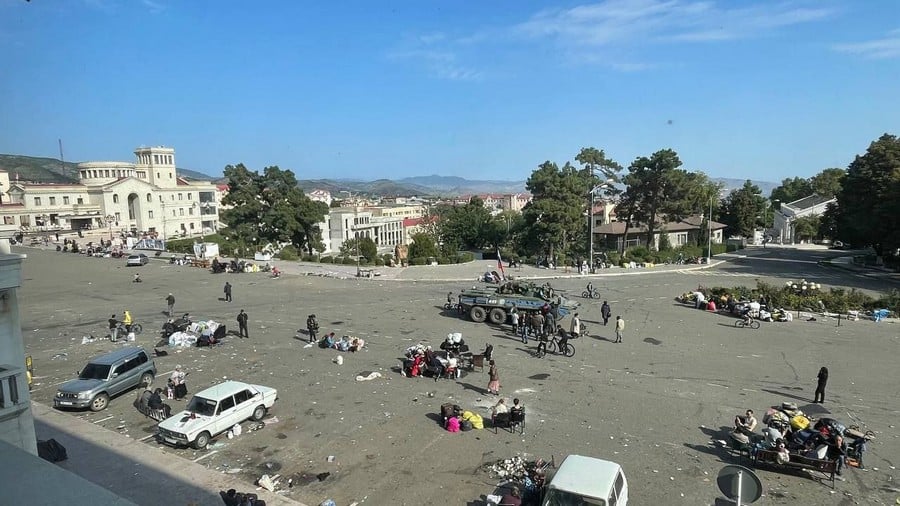People “filter” facts to form their picture of the world.
Like peoples’ history, current events are rich in many, often contradictory facts. Historians, commentators, journalists, propagandists, and the ordinary people under their influence select from this deluge of facts a part (which is true) and the rest (which are equally true) they either ignore altogether or regard as secondary. Accordingly, Vasak Siwni is either a traitor or a pro-state pragmatist. Stalin is either a cannibal or a man who turned a backward agrarian country into a superpower. Today’s Armenian oppositionists are either patriots concerned about the fate of Artsakh or representatives of a “foreign agency network.”
Falling into extreme relativism and insisting that “everyone has their truth, and it is not clear what happened (or is happening)” is to appear in the so-called “postmodern” trajectory. The other extreme is to think that eternal truths are carved once and for all on some rocks. I’m rather in favor of the approach that the facts are different, and one should constantly correct them without prejudices, without fear of admitting one’s mistakes, and having no pretensions to carve out some “ultimate truths.”
What are the ‘filters’ through which people ‘sift’ classify the facts? Those filters are called “narratives”. Let me give a simple example. Recently, in the heat of opposition rallies, someone approached me and reminded me about Robert Kocharian’s “4 billion dollars”. I replied that the fact that the second President got rich illegally is beyond doubt for me, but whether his fortune is 4 billion, I don’t know. (By the way, our law enforcement officers did not charge him even a cent). But why is that citizen talking about it now, during national disasters and protests? Quite simply, because the story of “the looting of the former” is dominant for him, it is the “optics” through which he views the depopulation of Artsakh and the events that followed it.
Read also
Narratives are historical, and people view past events by today’s standards. For example, a few years ago in the United States, there was a wave of dismantling statues of Christopher Columbus. He was “turned out” to be a “racist”. But it is necessary to consider whether the concept of “racism” existed at the end of the 15th century; was there even a remote idea of it? Can the Universal Declaration of Human Rights adopted in 1948 be applied to the events in 1492? Who was considered human and who was not, according to the stories accepted at the time of Columbus?
Narratives, in short, are highly variable, even when talking about a much shorter period. When I entered school as a teacher in 1983, hitting children was considered a common occurrence. It is a highly unusual phenomenon, and each case is discussed on social networks for several days. What happened in Armenia and Artsakh in 1990-2000 is unacceptable from the point of view of specific standards, and the “anti-Karabakh” narrative was formed based on it. A part of them was taken from the “bunch” of facts, the part that was beneficial for the propaganda of the previous opposition. In that regard, the “Mongolian-Tatar” thesis put forward by the first President of RA in 2007 is interesting. I know what Levon Ter-Petrosyan meant: the peculiarities of internal and foreign policy specific to the state formed in the 13th century. But, perhaps against his will, the emerging narrative was that foreign conquerors had come from a foreign land to rule us and must be driven out.
The variability of narratives is clearly seen in the attitude of Armenians towards Russia. Twenty years ago, taxi drivers posted Putin’s picture on their cars. The song “Putin Said to Give Passage to Armenians” was popular in their environment. A few days ago, the taxi driver asked me: “Do you agree, don’t you, that the Russians made all this?” And without waiting for my answer, he started to list specific facts. Those facts (I will repeat what I wrote initially) are real, not made up. A set of facts corresponding to a particular story is separated from the whole “puzzle.” That narrative benefits the government and is propagated by it as much as possible because the Russians are guilty, so Pashinyan is not guilty. As for the driver’s question, I can’t answer “Yes, I agree” or “No, I don’t agree”. Because I see the bigger picture, and at least I try not to be prejudiced.
But fighting narratives is futile. Challenging a person’s narrative is tantamount to assaulting their identity.
ARAM ABRAHAMYAN
“Aravot” daily newspaper, 03.10.2023



























































